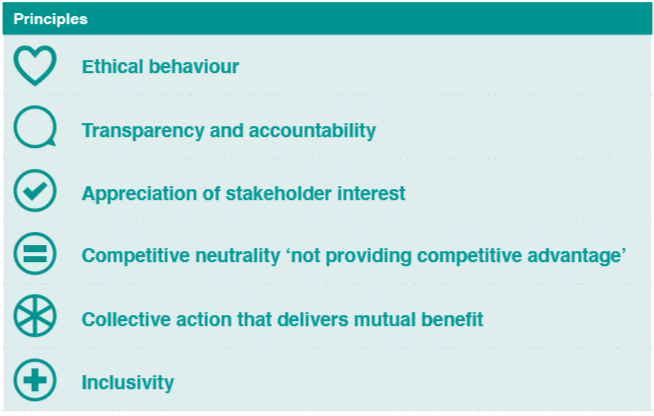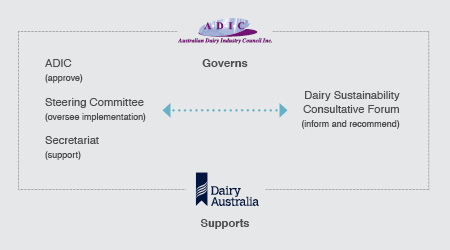Feedback
Would you like to comment on our Framework principles?
The Framework helps us deliver on our promise to create rewarding livelihoods for our people, nourish consumers with nutritious food, provide best-care for all our animals and leave the environment in better shape for the future.
Keeping Australian dairy in business for the long term is the fundamental principle of the Australian Dairy Sustainability Framework. It sets measurable goals for economic prosperity, nutrition, animal welfare and natural resource management. It reflects the dairy industry value chain from farm inputs such as feed, through farm production, manufacturing, retail and packaging, export and consumption.
The Framework was launched in 2012 following extensive consultation with dairy farmers and manufacturers as well as stakeholders including government, retailers, customers, NGOs and interest groups.
Development was guided by a set of agreed principles to help identify and prioritise issues, guide ongoing action and decision-making to include ethical behaviour, transparency and accountability, appreciation of stakeholder interests, competitive neutrality, collective action to deliver mutual benefit.
The Framework seeks to consider all issues along the value chain that have the potential to affect the sustainability of the dairy industry. Inputs through the value chain include on farm and manufacturing sector.
On farm inputs
In the manufacturing sector
The development of the Framework was informed by international guidelines and standards, including the United Nations Global Compact and the Global Reporting Initiative (GRI) G4.
A set of agreed principles was developed to help identify and prioritise issues and guide ongoing action and decision-making. These principles include an appreciation of stakeholder interests which ensures that stakeholders from across the dairy value chain are engaged directly in the ongoing development of the Framework.

Our approach has also been influenced by the United Nations Sustainable Development Goals (SDGs). The SDGs outline 169 targets across areas including poverty reduction, food security and energy and will directly influence national policy settings. Here we explain how our goals align with the SDGs.
The Framework is also informed by the global Dairy Sustainability Framework of which Dairy Australia is a Governor and Aggregating Member, and the Australian Dairy Products Federation (ADPF) is an affiliate member. and by Dairy Australia’s membership of the Sustainability Agriculture Initiative (SAI) Platform’s dairy working group.
The ADIC is the dairy industry’s peak policy body. The ADIC has overall responsibility for the Framework — setting and reporting progress against the Framework targets and performance measures.
Dairy Australia, the industry-owned national service body, facilitates and supports the ADIC in developing and implementing the Framework.

A Steering Committee was established in 2012 to drive the ongoing development and implementation of the Framework. The Steering Committee meets monthly and includes representatives from farmer organisations as well as manufacturing companies. The Steering Committee seeks endorsement from the ADIC on any major recommendations.
The Dairy Manufacturers Sustainability Council (DMSC) brings together the largest Australian dairy manufacturers to improve sustainability practices and spearhead collaborative action across the industry. The eight-member companies are responsible for processing over 85% of the national milk supply.
Reporting by the DMSC contributes to tracking industry progress against the Australian Dairy Industry Sustainability Framework under 'Reducing our environmental impact' – targets 9, 10 and 11. See our progress against these environmental targets.
The DMSC’s Environmental Sustainability Scorecard 2016/17 shows manufacturers’ progress in water use, greenhouse gas emissions and waste reduction against targets set in the Australian Dairy Industry Sustainability Framework. Performance in all three areas is moving towards achieving the 2020 targets. This report highlights that DMSC member companies have achieved significant reductions in greenhouse gas (GHG) emissions intensity, water consumption intensity and waste sent to landfill. Access DMSC Reporting.
Engagement with our stakeholders within and beyond the dairy industry has been a cornerstone of the development and implementation of the Framework, and is critical to ensure it remains robust and relevant. Our stakeholders include:
This takes place through the formal mechanisms of the Steering Committee and the Consultative Forum, as well as consultation with industry representative bodies and other stakeholders on specific issues facing the industry.
The Dairy Sustainability Consultative Forum was established in 2013. Read the latest Consultative Forum May 2021 report.
The Forum consists chiefly of non-industry stakeholders. It provides feedback on our progress and facilitates two-way discussion on emerging issues both nationally and internationally. This group of over 40 individuals from across our stakeholder landscape meets twice a year to provide ongoing guidance and input into the Framework.
Throughout the year we continue to engage with our stakeholders via our monthly eNews which features updates on our sustainability progress, links to relevant articles and events.
A materiality assessment was undertaken during 2019 to determine the priority issues for both the development of the Framework and related performance reporting. This work refreshed previous materiality reviews undertaken in 2011-12 and 2016. The assessment was informed by various standards and guidance including the Global Reporting Initiative (GRI) Standards, Sustainability Accounting Standards Board (SASB), the UN Sustainable Development Goals (SDGs), as well as the Dairy Sustainability Framework (DSF) and the Sustainable Agriculture Initiative (SAI) Dairy Working Group’s Declaration of Trust to support business-to-business (B2B) responsible sourcing.
Materiality was defined according to two dimensions:
The most material topics emerging from the assessment were:
In 2020 the Dairy Sustainability Steering Committee will review these highly material topics and recommend strategic responses for consideration by the Australian Dairy Industry Council.
Would you like to comment on our Framework principles?